Off the coast of Malta, a flimsy rubber boat sent a distress signal to the Alarm Phone hotline on June 22 last year. The boat had set off from Libya the day prior and had been adrift in the Mediterranean after running out of fuel.
While the government of Malta was responsible for conducting the rescue, it was ultimately a Doctors Without Borders/Médecins Sans Frontières (MSF) search and rescue team that pulled survivors to safety. By the time our team arrived on the scene, one person had fallen overboard and was believed to have drowned, survivors told us. The other passengers had been waiting more than 38 hours after sending the first distress call, repeatedly communicating with Maltese authorities who refused to take them aboard.
The following accounts were collected aboard MSF’s rescue ship Geo Barents in the early hours of June 24, 2023. Survivors described what happened during those 38 hours they waited for help—and the human toll of Europe’s anti-migration policies, including refusals of assistance to boats in distress.
All names have been changed to protect privacy.
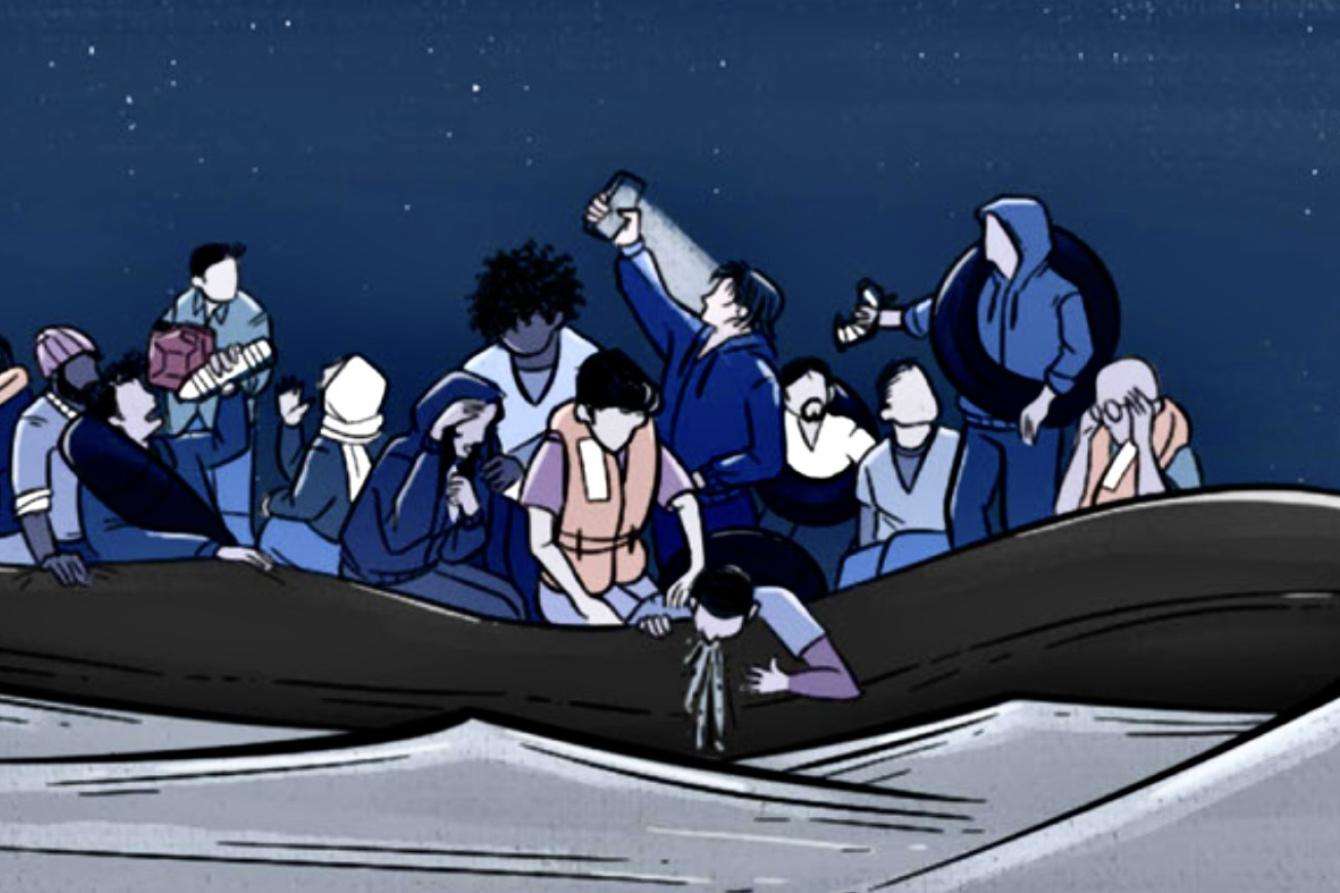
Stranded at sea
“It is not very clear what happened at the beginning, how long we were traveling for. The landscape was just the sea.” — Gul, 27
“We left Libya around 3 a.m. thinking that we would arrive in Italy in one day and half. So after this time, we finished all our water, food, and fuel [...] We had spent almost two days at sea. The engine was working but on the third day, we ran out of fuel. The boat stopped and did not move anymore. We didn’t have water or food. We called the Alarm Phone. We also sent our location to them.” — Idris, 17
“We wanted to keep the empty fuel canisters with us because we had asked for help a day ago already, and no one had come to help us. So we told ourselves that we needed to keep the empty fuel canisters so that if, God forbid, the boat [capsized], we would have something else other than only lifejackets to make us float, to keep up above the water line. So that we would not die.” — Gul, 27
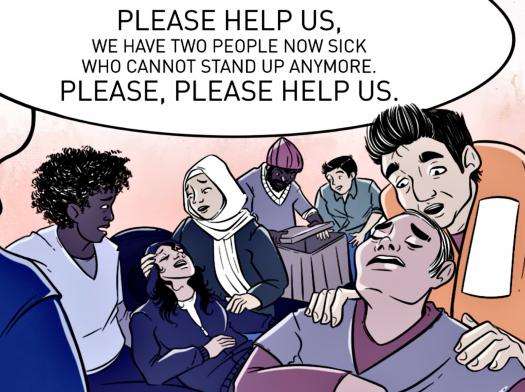
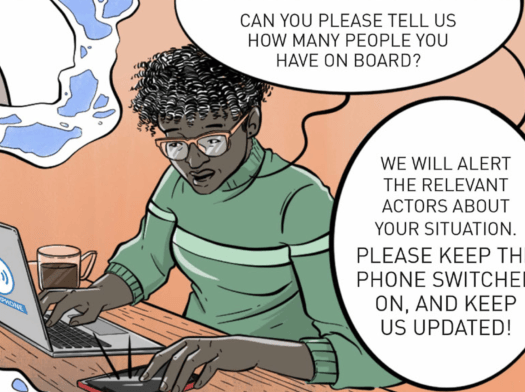
© MSF
A passenger overboard
“I will jump in the water and bring it back, a young man on the boat said.
He stated that he is a swimmer. When he reached the canister, we found out it had lost its cover, so a lot of water entered. It was not a tool that he could rely on to help him float.
On his way back, the waves were strong and pushed him away. And we did not have fuel to head towards him.” — Adam, 44
“Panic started onboard, The women started to scream. We had the phone, so we called so that someone would help. We had four oars. One of the guys extended one of the oars towards the man in the water so that he could hold on to it, but he was too far away from us. Three guys started to row, while the rest tried to collect the little amount of fuel that remained in the other canisters to add it to the engine to see if it could start, even just a bit, so that we could get closer to our companion. But we did not manage to start the engine. We tried to get closer to him, but the waves were stronger.
It was very strange. I remember thinking how is it possible, that just like that, he was so far so quickly?” — Gul, 27
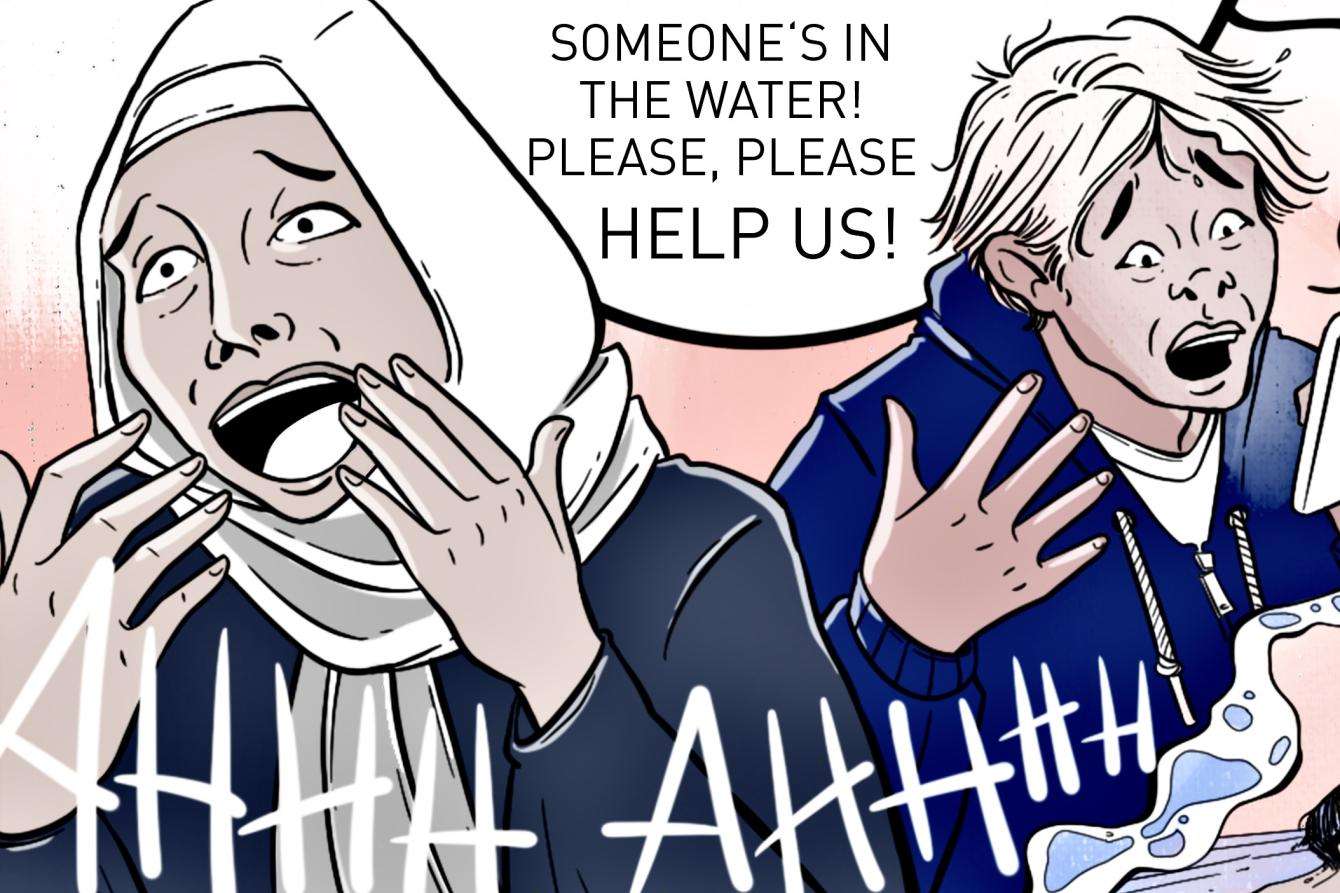
“I took the paddles and I tried to reach him with it. I almost fell in the water. I threw the paddle to him so he could hold on to it. We started moving the boat with our hands and the other three paddles, but we were getting nowhere. [The young man] was screaming for help, so we threw him another empty canister. But the distance was getting greater: 50 meters, 100 meters ...
That is how we lost our brother. He tried to get the canister back. We tried to move the boat but we did not have fuel. And in the sea, there were lots of waves; the waves were simply too high. We were very sad that we lost him, that we couldn’t bring him back.” — Idris, 17



© MSF
“People were trying to turn on the motor, others trying to collect whatever fuel they could, even as much as a cup. Others were trying to use their hands as a paddle. We really tried until he disappeared.
It was a tragedy, and we were all shocked. I did not know him very well—only for three days. He was a calm and polite person. We spent the journey together, chatting and exchanging stories. I cried all the way [back]. Sometimes I feel guilty, and I ask God if I could have been able to help him. What could I have done more?” — Adam, 44
Vessels arrive, but no rescues until Geo Barents
Malta—the responsible authority for that stretch of the sea—and Italy had been informed of the distress case immediately. Yet more than 38 hours passed between the first distress alert and the rescue of the boat by the MSF rescue vessel Geo Barents. The timeline of the events as reconstructed by the civil society groups and the accounts of survivors collected on the MSF rescue ship suggest that Malta tried to avoid the arrival of the boat on its own shores by all possible means.
In line with maritime conventions, the rescue coordination center in Malta is legally responsible for coordinating any rescue operations in the event of an emergency or accident within its search and rescue region. However, evidence collected by NGOs and survivor accounts suggest that over the course of three days, Malta not only repeatedly ignored distress calls but also instructed a merchant vessel that came to help not to take the people on board. Eventually, according to survivors’ testimonies, the Maltese authorities sent a patrol boat of the Armed Forces of Malta twice to provide the distress boat with fuel so that it would continue its journey to Italy. Survivors onboard the Geo Barents told the MSF teams that they had desperately pleaded to be rescued, yet their calls for help were ignored.
“We do not need fuel, please help us, take us with you, please do not leave us in the middle of the sea, we asked. Please at least take the women. But they refused all our demands.” — Adam, 44
“We had spent more than four hours sitting in the boat like that. No one came to our rescue. We were just sitting on the boat. When we asked them, when do you rescue us? they replied, just wait, we need to talk to the authorities, maybe we will try.” — Idris, 17
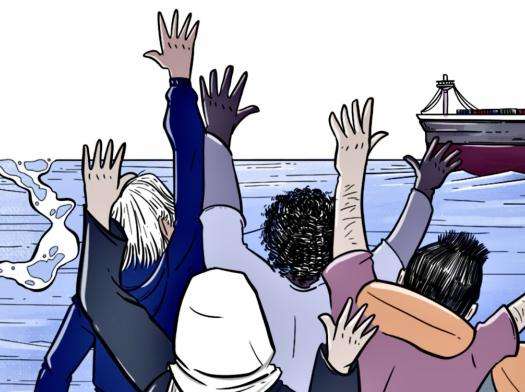
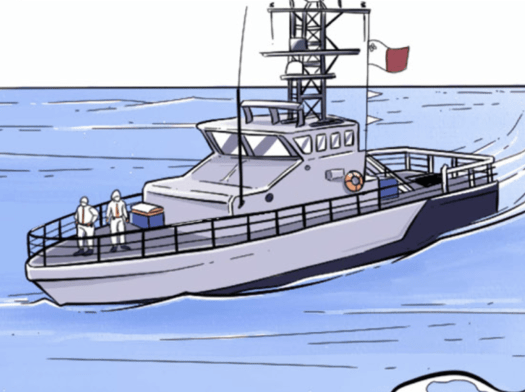
@ MSF
"When we lost our brother, we tried to call the Alarm Phone again. We said we lost one of us. We spent another hour at sea without any rescue. Finally, at one point we could see a big boat coming towards us.” — Idris, 17
“There were three men onboard, wearing white suits. They got closer to us. Someone from our boat told them take us with you, and they told us they were bringing us fuel. We told them we didn’t want fuel. Our boat had been exposed to strong heat for the past three days. We were scared, we could not continue on this boat. They told us we will give you water, and food. They gave us water, food, and three gallons of fuel. They told us, you are 50km away from Italy. There is no need for us to help you. Continue on your own.” — Gul, 27
“At 5 a.m., the waves got too high; we could not move. We called the Alarm Phone again. They said, rescuers are looking for you now. We gave them our location.
We tried to move, slowly, slowly, and called the Alarm Phone again. They said, be strong, the rescue is near. We waited two more hours until we could see boat Geo Barents.” — Idris, 17
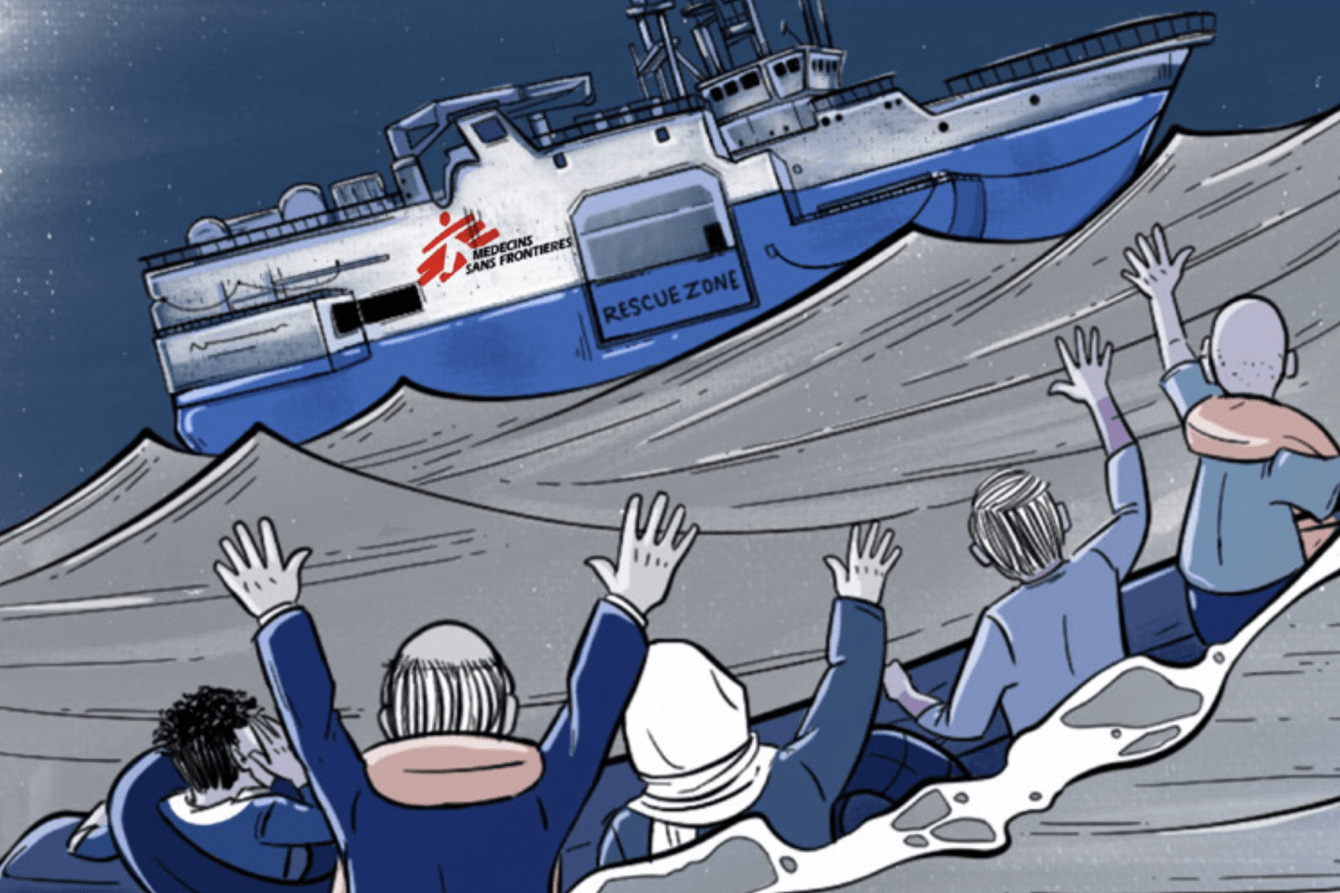
The human impact of EU migration policies
Civil society groups and NGOs including MSF, Alarm Phone, and SeaWatch are trying to fill this shameful void in Mediterranean search and rescue. Maltese authorities must put an end to the country’s policy of systematically refusing to carry out rescue operations and deliberately putting lives at risk.
“Who knows if we would be still alive without you [MSF]. We do not know if we would have arrived. Maybe we did not have to lose our brother. There may be more boats out there.
If the European people have the power, they can increase the rescue at sea for the ones fleeing from Libya. Because, there you do not have a choice; they force you to take the sea.” — Idris, 17
“I just want to tell the European Union and the Maltese government that if they would have saved us, our young fellow traveler could still be here with us. They knew about us. Instead of giving us just fuel, they should have taken us with them. There were only 14 [of us]. They had enough space on their boat. I cannot imagine the position of his family. They are all waiting for him.” — Adam, 44

“I hope that what happened to us never happens to anyone else. Regardless of where we are, we are human, and these were moments of death. No one can say in these moments ‘I want refugees,’ or ‘I don’t want refugees’ and let them die. So I hope that there will be no more playing around with the souls of human beings, regardless of nationality, whether they are Arab or not. What the Maltese did is awful ...
You [Malta] had the capacity to rescue us and bring us with you, but you did not. You saw a boat in the condition of ours, and you gave us fuel? We were in European waters and a young man had died. I will never forget.” — Gul, 27




